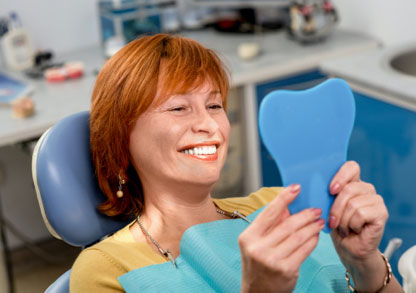5 myths about dental implants

Painful? Scary? Expensive? Just for the elderly? No way.
Dispense with the myths and learn the facts about long-lasting dental implants.
Myth #1: Dental implants are just for old people.
Fact: Your jawbone is often fully developed by your early 20s. So if you’re healthy overall and your gums and bones are in good shape, you can consider dental implants at any age. Dental implants are often the best option to replace damaged or missing teeth even if you’re relatively young.

Myth #2: Everyone will be able to tell if I have dental implants.
Fact: The good thing about dental implants is how much they look like your natural teeth. Unless you tell people you’ve gotten dental implants, they probably won’t even notice.
Myth #3: Having dental implants is painful.
Fact: Getting dental implant surgery is less painful than you might think. You may feel some pressure during the procedure, but because your teeth and gums will be numb from an anesthetic, you won’t feel pain.
Myth #4: Dental implants are expensive.
Fact: Dental implants might not be as expensive as you'd expect. In fact, they can be a good investment. Dental implants can last several years longer than a bridge, which can last about seven to 15 years. Implants can last for an average of 10 to 15 years or longer, depending on how well you care for them.
Talk to your dentist to find out what your benefits will cover. As long as you take good care of your teeth and gums, your implants will be in good shape for years to come.
Myth #5: I won’t be able to eat my favorite foods if I get dental implants.
Fact: The only time this will happen is during the first few days after getting the implants, when you need to allow the surgical area to heal. Once this is done and your dentist gives you the go-ahead, you can eat pretty much whatever you want. (Naturally, we recommend lots of fruits and veggies!)
Last updated October 18, 2021
Related articles:
The oral health information on this website is intended for educational purposes only. Always consult a licensed dentist or other qualified health care professional for any questions concerning your oral health.


